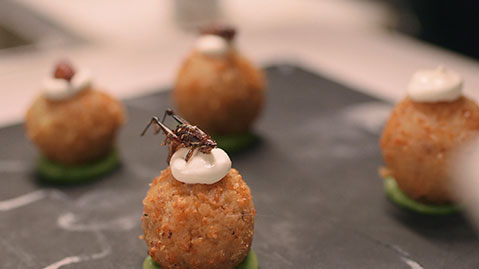The Gateway Bug
Directors Johanna B. Kelly & Cameron Marshad

Insects are one of the most sustainable and protein-packed sources of food on the planet. But can a handful of innovators, including a team of grad students from UCSB, convince the American public that bugs are the right choice? This documentary finds out.
See TheGatewayBug.com.
How did you learn about this insect-as-food movement?
Johanna: I’d never heard of insects as food until February 2015 while brunching in Santa Barbara with my old friend (and Gateway Bug star) Tyler Isaac. He was discussing his eco-entrepreneurship Masters at UCSB, where students develop sustainable businesses addressing current environmental issues. After witnessing the severity of today’s overfishing problem first-hand and the environmental destruction caused by unsustainable and unenforced/unregulated harvesting methods, Isaac began investigating insect food production to reduce pressure on wild fisheries. He told us it wasn’t just fish but insect protein bars and pasta for human consumption too!
When did you realize that it would make a compelling documentary?
Johanna: At that brunch! We were shocked to learn that livestock now covers 45% of Earth’s land; animal agriculture is responsible for 91% of Amazon destruction and 18% of greenhouse gas emissions, projected to increase 80% by 2050. By the end of breakfast we knew we had to share all we’d learned. Realizing that eco-eating a climate diet is the next big thing in minimizing the impact of global warming, we felt a responsibility to spread all we’d learned. As filmmakers, a documentary was the obvious platform.
Cameron: But we never anticipated continuing on to make a full length doc over the span of two years.
How many trips did you make to Santa Barbara?
Cameron: Including the trip in February 2015, we’ve made two trips to Santa Barbara. The second trip was in June 2015, we stayed for around four days or so.
Did you eat many bugs in the making of this film?
Cameron: I’ve eaten a lot of crickets and have tried combining cricket flour into lots of meals. I’ve also eaten mealworms and purged black soldier fly lipids. I’m in agreement with David Gracer in that the BSF (black soldier fly) fat tastes like curried lentils.
How were you able to get Andrew Zimmern?
Cameron: We had a contact through a friend of a friend and we reached out via email with our idea. By then we had already shot for some time, so we had a good idea of what we wanted to ask him. He’s a really passionate person, and on many more topics beyond bug eating.
Why do you use so much archival footage in the film?
Johanna: Our research showed this isn’t new, we’ve been told our diet is unsustainable for a very long time and finding so much U.S. government educational footage from the ‘60s and ‘70s warning this compounded our concerns that nobody was heeding the empirical research. As long as we could afford to keep exploiting resources change was unlikely. We felt interviews alone mightn’t be as compelling as the American government, and the terrifying consequences of simply draining our resources until they’re gone compelled us to remind audiences that what we’re saying is neither radical nor groundbreaking.
What do you think the future of eating bugs is?
Johanna: When one in eight Americans lack a secure supply of food and one billion go hungry worldwide, the future of eating as we know it now is simply impossible. From food waste (Americans throw out the equivalent of $218 billion each year, which includes 25% of all freshwater and huge amounts of unnecessary chemicals, energy, and land) to farming, we’re asking how changing daily eating habits can reduce global warming and feed humanity one meal at a time.
Most of our interview subjects reference the United Nations FAO paper Future prospects for food and feed security, which warns that to combat exploding population and unsustainable diets we really should eat bugs. I think it’s an easier sell in the feed arena and changing what we feed cattle, fish, and poultry alone would have a profound impact on the environment given how much meat is consumed in the West. So I think the future is pretty bright for eating bugs.
Cameron: I believe it’s an option we cannot afford to stick our noses up at. It’s largely an issue of stigma, I believe. So it will take lots of education starting at younger ages to nurture future generations of bug eaters. They’re quite tasty.



